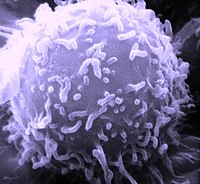
Photo from wikipedia
Objectives Data on the immune response after two doses of BNT162b2 are so far limited. Previously infected individuals were excluded from pivotal clinical trials and the optimal dose regimen in… Click to show full abstract
Objectives Data on the immune response after two doses of BNT162b2 are so far limited. Previously infected individuals were excluded from pivotal clinical trials and the optimal dose regimen in this population has not been clearly studied. The CRO-VAX HCP study aims at investigate the early antibody response in a population of healthcare professionals having received two doses of the BNT162b2 mRNA COVID-19 vaccine. Methods The CRO-VAX HCP study is a multicenter, prospective, interventional study conducted in several sites in Belgium. The study included 231 healthcare professional volunteers who received the two-dose regimen of the BNT162b2 mRNA COVID-19 vaccine. Of these, 73 were previously infected by SARS-CoV-2 and 158 were uninfected and seronegative. In the first group, blood samples were collected at baseline and after 2, 4, 7, 10, 14, 21, and 28 days. In the second group, samples were obtained at baseline and after 14 and 28 days. Antibodies against the SARS-CoV-2 nucleocapsid and the receptor binding domain of the S1 subunit of the spike protein were measured in all individuals at different time points. Results In uninfected individuals, 95.5% (95% CI 91.0-98.2%) developed anti-spike antibodies after 14 days and a 24.9-fold rise (95% CI 21.4-28.9%) in antibody titer was observed after the second dose. In previously infected individuals, peak antibody response was reached after 7 days (i.e. 6,347 U/mL) and the second dose did not lead to significantly higher antibody titers (i.e. 8,856 to 11,911 U/mL). Antibody titers were higher in previously infected individuals. Conclusions This study supports the concept that a single dose of BNT162b2 would be sufficient in previously infected individuals.
Journal Title: Clinical Microbiology and Infection
Year Published: 2021
Link to full text (if available)
Share on Social Media: Sign Up to like & get
recommendations!